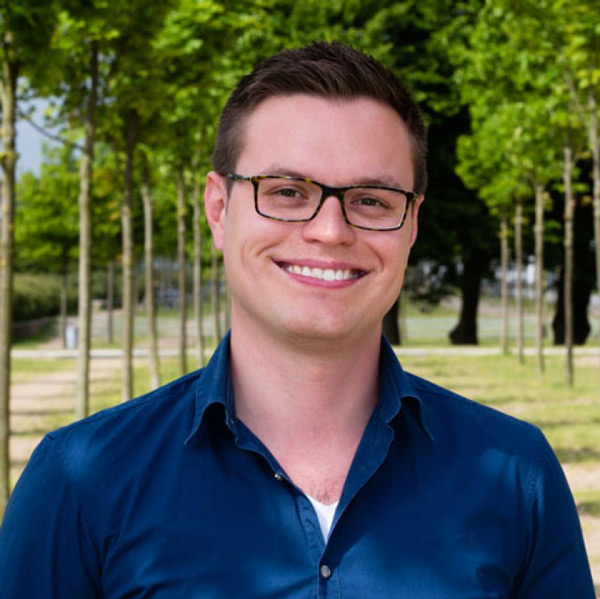
Victor Krajka
PhD Student
Name: Victor Krajka
Date of Birth: August 20th, 1988
Place of Birth: Braunschweig, Germany
Position/Title: PhD student; supervised by Aleksandar Rakovic, PhD; task group: Molecular Mechanisms of Parkinson’s Disease
Address: Institute of Neurogenetics and Section of Clinical and Molecular Neurogenetics at the Department of Neurology, University of Lübeck
Ratzeburger Allee 160, 23538 Lübeck, Germany
Phone: +49 451 3101 8205; Fax: +49 451 3101-8204
Email: victor.krajka@neuro.uni-luebeck.de
Research Training and Scientific Experience
2019: Research stay (Laboratory of Carsten Janke, PhD), Université Paris Sud, TIRF-analysis of TUBB4A mutations in whole cell lysates.
2018: Research stay (Laboratory of Reinhard W. Köster, PhD), TU Braunschweig Monitoring oligodendrocyte development in zebrafish larvae transiently overexpressing TUBB4A mutations.
2015 – present: Doctoral thesis (Laboratory of Christine Klein, MD) University of Lübeck, Molecular characterization of TUBB4A mutations causing movement disorders and neurodegeneration.
2014 – 2015: Master thesis (Laboratory of Christine Klein, MD) University of Lübeck, Establishment and comparison of ventral telencephalic patterning protocols for induced pluripotent stem cells.
2013 – 2014: Internship (Laboratory of Markus Schwaninger, MD) University of Lübeck, Pharmacological characterization of tanycytic subtypes upon murine organotypic brain slices with intracellular calcium imaging.
2013: Internship (Laboratory of Petra Boukamp, PhD) German Cancer Research Center in Heidelberg, Investigating the impact of UV light on the chromatin structure of telomeres in fibroblasts using immunofluorescence, Southern blot, and real-time-PCR analysis.
2012: Bachelor thesis (Laboratory of Karl L. Rudolph, MD) University of Ulm, Verification of a shRNA-screen in human cell lines with respect to telomere length alterations via fluorescence in situ hybridization, and Southern blot analysis.
Educational Record
2012 – 2015: Master degree programme: Molecular Life Science, University of Lübeck Main focus: Neuroscience
2009 – 2012: Bachelor degree programme: Biochemistry, University of Ulm
2019: EMBO Short Term Fellowship
Enabled the research stay in Janke's laboratory and led to a stronger network with the Institute of Neurogenetics.
- Oral presentation, German Society of Neurology Congress (2019), “From hobby horse gait to hypomyelination: Elucidating the phenotypic spectrum caused by mutations in TUBB4A.” Co-organiser of the session “The broad spectrum of tubulinopathies: hunting for disease-associated mutations”, kindly represented by Kerstin Tanzer
- Poster presentation, 3rd Brainswick (2018) “Efficient protocol for the generation of human induced pluripotent stem cell-derived oligodendrocytes”
- Poster presentation, German Society of Neurology Congress (2018) “Impaired swimming behavior in zebrafish transgenic models of whispering dysphonia and hypomyelination with atrophy of the basal ganglia and cerebellum.”
- Poster presentation, EMBO Symposium – Microtubules: From Atoms to Complex Systems (2018) “Impaired neuronal differentiation and microtubule dynamics caused by mutations in TUBB4A.”
- Oral presentation, German Society of Neurology Congress (2017) “Heterozygous TUBB4A knock-out impairs mitochondrial motility in a human neuronal model of DYT-TUBB4 (DYT4) dystonia.”
- Poster presentation, Movement Disorder Society International Congress (2016) “Heterozygous TUBB4A knock-out impairs mitochondrial motility in a human neuronal model of DYT4 dystonia.”
- Poster presentation, EMBO Symposium – Microtubules: From Atoms to Complex Systems (2016) “Heterozygous TUBB4A knock-out impairs mitochondrial motility in a human neuronal model of DYT4 dystonia.”
- Krajka V, Vulinovic F, Genova M, Tanzer K, Jijumon AS, Bodakuntla S, Tennstedt S, Mueller-Fielitz H, Meier B, Janke C, Klein C, Rakovic A. H-ABC- and dystonia-causing TUBB4A mutations show distinct pathogenic effects. Sci Adv 2022;10:eabj9229.
- Krajka V, Naujock M, Pauly MG, Stengel F, Meier B, Stanslowsky N, Klein C, Seibler P, Wegner F, Capetian P. Ventral Telencephalic Patterning Protocols for Induced Pluripotent Stem Cells. Front Cell Dev Biol 2021:716249.
- Dulovic-Mahlow M, Trinh J, Kandaswamy KK, Braathen GJ, Di Donato N, Rahikkala E, Beblo S, Werber M, Krajka V, Busk ØL, Baumann H, Al-Sannaa NA, Hinrichs F, Affan R, Navot N, Al Balwi MA, Oprea G, Holla ØL, Weiss MER, Jamra RA, Kahlert AK, Kishore S, Tveten K, Vos M, Rolfs A, Lohmann K. De Novo Variants in TAOK1 Cause Neurodevelopmental Disorders. Am J Hum Genet 2019;1:213-220.
- Vulinovic F, Krajka V, Hausrat TJ, Seibler P, Alvarez-Fischer D, Madoev H, Park JS, Kumar KR, Sue CM, Lohmann K, Kneussel M, Klein C, Rakovic A. Motor protein binding and mitochondrial transport are altered by pathogenic TUBB4A variants. Hum Mutat 2019;12:1901-1915.
- Pauly MG, Krajka V, Stengel F, Seibler P, Klein C, Capetian P. Adherent vs. Free-Floating Neural Induction by Dual SMAD Inhibition for Neurosphere Cultures Derived from Human Induced Pluripotent Stem Cells. Front Cell Dev Biol 2018:3.
- Prasuhn J, Mårtensson CU, Krajka V, Klein C, Rakovic A. Genome-Edited, TH-expressing Neuroblastoma Cells as a Disease Model for Dopamine-Related Disorders: A Proof-of-Concept Study on DJ-1-deficient Parkinsonism. Front Cell Neurosci 2018:426.
- Capetian P, Azmitia L, Pauly MG, Krajka V, Stengel F, Bernhardi EM, Klett M, Meier B, Seibler P, Stanslowsky N, Moser A, Knopp A, Gillessen-Kaesbach G, Nikkhah G, Wegner F, Döbrössy M, Klein C. Plasmid-Based Generation of Induced Neural Stem Cells from Adult Human Fibroblasts. Front Cell Neurosci 2016:245.
